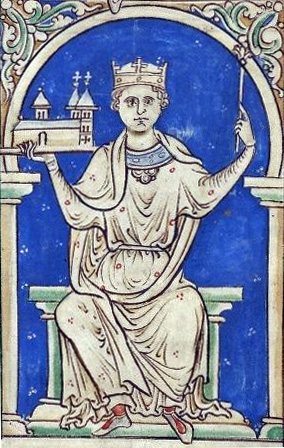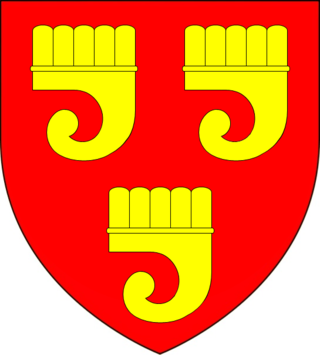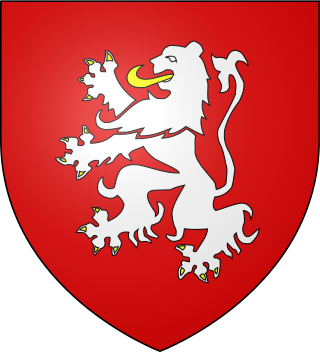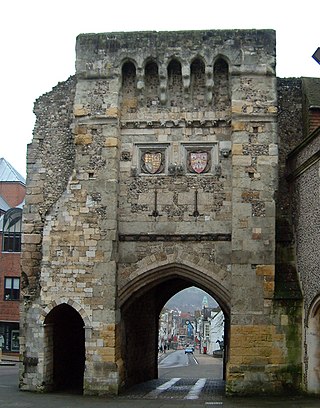Related Research Articles

Stephen, often referred to as Stephen of Blois, was King of England from 22 December 1135 to his death in 1154. He was Count of Boulogne jure uxoris from 1125 until 1147 and Duke of Normandy from 1135 until 1144. His reign was marked by the Anarchy, a civil war with his cousin and rival, the Empress Matilda, whose son, Henry II, succeeded Stephen as the first of the Angevin kings of England.

Year 1215 (MCCXV) was a common year starting on Thursday of the Julian calendar.

William Marshal, 1st Earl of Pembroke, also called William the Marshal, was an Anglo-Norman soldier and statesman during High Medieval England who served five English kings of the Angevin Empire: Henry II and his son and co-ruler Young Henry, Richard I, John, and finally Henry III.

The Anarchy was a civil war in England and Normandy between 1138 and 1153, which resulted in a widespread breakdown in law and order. The conflict was a war of succession precipitated by the accidental death of William Adelin who drowned in the White Ship disaster of 1120. Henry sought to be succeeded by his daughter, known as Empress Matilda, but was only partially successful in convincing the nobility to support her. On Henry's death in 1135, his nephew Stephen of Blois seized the throne, with the help of Stephen's brother Henry of Blois, who was the bishop of Winchester. Stephen's early reign saw fierce fighting with disloyal English barons, rebellious Welsh leaders, and Scottish invaders. Following a major rebellion in the south-west of England, Matilda invaded in 1139 with the help of her half-brother Robert of Gloucester.

Robert FitzRoy, 1st Earl of Gloucester was an illegitimate son of King Henry I of England. He was the half-brother of the Empress Matilda, and her chief military supporter during the civil war known as the Anarchy, in which she vied with Stephen of Blois for the throne of England.

Robert de Beaumont, 2nd Earl of Leicester was Justiciar of England 1155–1168.

The First Barons' War (1215–1217) was a civil war in the Kingdom of England in which a group of rebellious major landowners led by Robert Fitzwalter waged war against King John of England. The conflict resulted from King John's disastrous wars against King Philip II of France, which led to the collapse of the Angevin Empire, and John's subsequent refusal to accept and abide by Magna Carta, which John had sealed on 15 June 1215.

Ranulf II, 4th Earl of Chester (1099–1153), was an Anglo-Norman baron who inherited the honour of the palatine county of Chester upon the death of his father Ranulf Meschin, 3rd Earl of Chester. He was descended from the Counts of Bessin in Normandy.
John Marshal, was a minor nobleman of Anglo-Norman origins who served as marshal of England and fought in the 12th-century civil war on the side of Empress Matilda. He is best remembered as the father of William Marshal.

In the Rout of Winchester the army of imprisoned King Stephen of England, led by his wife, Queen Matilda of Boulogne, Stephen's brother Bishop Henry of Blois, and William of Ypres, faced the army of Stephen's cousin Empress Matilda, whose forces were commanded by her half-brother Earl Robert of Gloucester. After Empress Matilda's army besieged a castle on the edge of Winchester, Queen Matilda's army arrived and blockaded the Angevin army within the city. Cut off from supplies, the Angevin army gave up the siege, then was crushed as it began to retreat. Robert of Gloucester was captured and was subsequently exchanged for Stephen, who was returned to the throne of England. However, the civil war known as The Anarchy dragged on with neither side gaining an advantage.
Harvey II, also known as Hervey Brito or Hervey le Breton, was a Breton nobleman. He was the Earl of Wiltshire in England between 1140 and 1141. About 1157, he succeeded his father, Guihomar III, as the Viscount of Léon in Brittany.
Events from the 1210s in England.
Roger Fitzmiles, 2nd Earl of Hereford, was an English noble who played an active and influential part in the wars between Empress Matilda and King Stephen.
Events from the 1140s in England.
Events from the 1130s in England.
Events from the 1080s in England.
The Battle of Wilton was a battle of the civil war in England known as The Anarchy. It was fought on 1 July 1143 at Wilton in Wiltshire. An army under King Stephen was stationed at Wilton Abbey, where it was attacked by an army led by Robert Earl of Gloucester. Although King Stephen's army was defeated, the king himself escaped capture.
Geoffrey Talbot was a medieval Anglo-Norman nobleman during the civil war of King Stephen of England's reign. His landholdings around Swanscombe are considered to possibly constitute a feudal barony. Although he was at Stephen's court in early 1136, by 1138 Talbot was supporting Stephen's rival, Matilda. After escaping capture twice, Talbot was captured by partisans of Stephen but was released. In 1139 and 1140, Talbot was engaged in military operations around Hereford, which included fortifying Hereford Cathedral in an attempt to take Hereford Castle.

The siege of Oxford took place during the Anarchy—a period of civil war following the death of Henry I of England without a male heir—in 1142. Fought between his nephew, Stephen of Blois, and his daughter, the Empress Matilda, who had recently been expelled from her base in Westminster and chosen the City of Oxford as her new headquarters. Oxford by now was effectively a regional capital and important in its own right. It was a well-defended city with both rivers and walls protecting it, and was also strategically important as it was at a crossroads between the north, south-east and west of England, and also not far from London.
Stephen Devereux was a powerful Marcher Lord, and held Lyonshall Castle controlling an important approach to the border of Wales. As a key member of William Marshal, 1st Earl of Pembroke retinue, he played a significant role in the Earl's support of King John during the First Barons' War, and during the minority of Henry III.
References
- Oksanen, Eljas. Social Identity and the Image of Flemings in England in Flanders and the Anglo-Norman World, 1066–1216. Cambridge: Cambridge University Press, 2012. 219–250.
- Asbridge, Thomas. The Greatest Knight: The Remarkable Life of William Marshal, the Power Behind Five English Thrones. New York, NY, Ecco, 2014.
![]() This article incorporates text from a publication now in the public domain : "Fitzhubert, Robert". Dictionary of National Biography . London: Smith, Elder & Co. 1885–1900.
This article incorporates text from a publication now in the public domain : "Fitzhubert, Robert". Dictionary of National Biography . London: Smith, Elder & Co. 1885–1900.